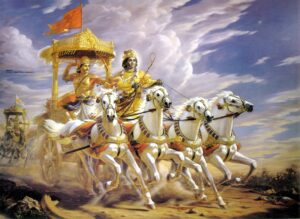Continued from – how can yama and niyama help in change management?
How does politeness always work in change?
This I learned while watching the cartoon “Barney” with my kids… “Say please and thank you, these are the magic words” and indeed they are, with an ability to reduce temperatures at bring logical discussion back on track. Don’t forget to say “Sorry”, even though it seems to be the hardest word, when appropriate.
How to separate the person from the problem.
 When the sense of identity is not under threat, then the conversation is calm and both sides become amenable for a rational discussion.
When the sense of identity is not under threat, then the conversation is calm and both sides become amenable for a rational discussion.
It is also a very important tool when punishments have to be delivered. It allows a personal reach of empathy to the person affected by use of power.
How does one implement this suggestion? Focus on the action – “I think this is a better option” or “this action has the following consequences, hence should be avoided” instead of “what were you thinking when you did this?” or “Are you out of your mind?” which impact the sense of Identity.
How can yama help in change management?
Let us review the other elements of yama – satya (truth or integrity), asteya (non-stealing), aparigrāhya (renouncing possessions), brahmacaryam (sexual continence), and mitāhāra (diet control).
Ahiṃsā is not “turning the other cheek”. The reason is that, if the other person doesn’t respect your sacrifice but slaps that too, the damage to the sense of identity can be devastating. Not everyone can absorb an assault on one’s sense of identity without damage to the Self.
Consequently, ahiṃsā is not non-violence under any circumstances. Ahiṃsā is any action which does not damage the sense of identity of any entity we interact with. This includes people, animals, plants and environment and most importantly, our own sense of Identity.
- What is common in all the above attributes? It is the ability to work in harmony (dharma) with others.
- What is the basis of effective functioning of these attributes?
How to inspire trust in others.
 It is simply not possible to function in a team if the team mates don’t trust you. So, how does one inspire trust in others? To start with, the gap between one’s words and actions should be minimal. This is integrity.
It is simply not possible to function in a team if the team mates don’t trust you. So, how does one inspire trust in others? To start with, the gap between one’s words and actions should be minimal. This is integrity.
One should not take that which is not one’s due; for instance, if someone has worked for the team, he should be acknowledged. Otherwise, the lack of integrity will destroy the team cohesiveness.
Similarly, not respecting the diversity of others could lead to isolation of individuals, thus reducing team cohesiveness.
How to control fear, anxiety and anger.
Anger arises from fear. Fear always arises due to probable loss of identity and manifests itself as anger. Also, fear can be very destructive because of the uncertainty it introduces into outcomes. Due to its nebulous quality, fear has the ability to destroy individuals and since it is easy to transmit, it can destroy confidence, capability and drive.
But, fear has the ability to disappear once it is confronted. How many feel fear before a test, going on stage or the annual appraisal only to see it disappear once the exam or show starts?
The dynamics of fear
Fear makes us do what we would not ordinarily do. Consequently, this damages our sense of identity or individuality or svatantra. Therefore, te ability to comprehend the truth in any situation, confront our fears and that of others and to follow through without compromise is a very critical test of integrity.
This applies to teams also. The ability to not take what one has not worked for is both astheya and sathya. Finally, team identity will be subjected to stress and fear of failure. Emotional balance within the team and its members can easily be lost. But, integrity must be retained and fear should to be overcome so that the goal is reached. This is the role played by leaders.
Some examples.

Example 1 – It is a historical fact that the losing side in any battle suffers maximum casualties during retreat and flight when fear, anxiety and panic grip the soldiers, leading to loss of unit cohesion. Consequently, they become easy prey for the victorious soldiers.
How does one control anxiety attacks and bouts of fear? Not easily. One has to keep confronting one’s fear which will come in various forms and slowly overcome them. This will take time and one will need to be aware of one’s behaviour and the underlying fears driving those behaviours.
Example 2 – how often do we hear the term – “he makes me so angry”. Well, actually how can the other person make anyone angry? It happens because we have given the other person the permission to make us angry! If we refuse to get angry, then no one can force us into that state.
Why is the ability to deal with diversity (brahmacaryam) critical?
As the world becomes a smaller place, our ability to deal with differences in cultures, sexual divergences, food habits, cleanliness, values and behaviour becomes a critical requirement. Why is it a problem? We are all brought up in a particular environment with certain values and systems which we imbibe and use as guiding beacons in life situations. This is conditioning or dharma. Consequently, when we are confronted with another dharma, we are able to adjust to those changes which are closely aligned with our own. However, as the differences increase, the fear of change increases resistance to change.
How does one increase one’s tolerance to diversity? Assimilate what you like, accommodate what you can, compensate if you need to, ignore if the situation is beyond your control and finally, if the situation is really terrible, disengage and walk away until balance is achieved again. If the anxiety is at a point which makes you dysfunctional, seek medical help.
Change is constant, our drive and ambition force us into various situations where we are either drivers or responders. If in this process, we are able to retain Homeostasis or a semblance of peace or if we are able to recover our balance quickly after we are subjected to any stimulus, then we can say that we are progressing…


